| Listing 1 - 10 of 14 | << page >> |
Sort by
|
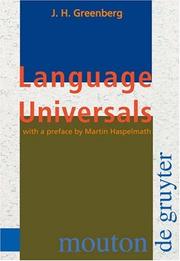
ISBN: 3110172844 3110899779 9783110899771 9783110172843 Year: 2005 Publisher: Berlin Mouton de Gruyter
Abstract | Keywords | Export | Availability | Bookmark
 Loading...
Loading...Choose an application
- Reference Manager
- EndNote
- RefWorks (Direct export to RefWorks)
"This is the latest version of the 1956 book which began the modern study of universals, and provides the foundation for many inquiries that followed. The hypotheses are cast at a moderate level of abstraction, and so are likely to survive as a basis for inquiry for many decades to come."Prof. Dr. William Labov
Linguistic universals. --- Universals (Linguistics). --- Universaliën (Taalwetenschap) --- Universals (Linguistics) --- Universaux (Linguistique) --- Linguistics --- Linguistics. --- Language and languages --- Linguistic science --- Science of language --- Universals --- Typology (Linguistics) --- linguistic typology. --- Universaux (linguistique)
Book
ISBN: 9789027211996 9789027211989 9789027273505 902721199X 9027211981 9027273502 1283539489 9786613851932 Year: 2013 Publisher: Amsterdam Benjamins
Abstract | Keywords | Export | Availability | Bookmark
 Loading...
Loading...Choose an application
- Reference Manager
- EndNote
- RefWorks (Direct export to RefWorks)
This clear and accessible introduction to linguistic typology covers all linguistic domains from phonology and morphology over parts-of-speech, the NP and the VP, to simple and complex clauses, pragmatics and language change. There is also a discussion on methodological issues in typology. This textbook is the first introduction that consistently applies the findings of the World Atlas of Language Structures, systematically includes pidgin and creole languages and devotes a section to sign languages in each chapter. All chapters contain numerous illustrative examples and specific featur
Linguistics --- Typology (Linguistics) --- Linguistic universals. --- Language and languages --- Universals (Linguistics) --- Grammar, Comparative and general --- Linguistic typology --- Linguistic universals --- Universals --- Typology --- Classification --- Typology (Linguistics). --- Typologie (Linguistique) --- Universaux (Linguistique)
Book
ISBN: 1283399482 9786613399489 3110238063 3110238055 9783110238051 9783110238068 9781283399487 6613399485 Year: 2011 Publisher: Berlin De Gruyter Mouton
Abstract | Keywords | Export | Availability | Bookmark
 Loading...
Loading...Choose an application
- Reference Manager
- EndNote
- RefWorks (Direct export to RefWorks)
The volume explores the relationship between linguistic universals and language variation. Its contributions identify the recurrent patterns and principles behind the complex spectrum of observable variation. The volume bridges the gap between cross-linguistic variation, regional variation, diachronic variation, contact-induced variation as well as socially conditioned variation. Moreover, it addresses fundamental methodological and theoretical issues of variation research. The volume brings together internationally renowned specialists of their fields while, at the same time, offering a platform for gifted and highly talented young researchers. The authors come from different theoretical backgrounds and through their work illustrate a rich array of scientific methods. All authors share a strong belief in empirically founded theoretical work. The contributions span a high number of languages and dialects from many parts of the world. They are extremely broad in their empirical coverage addressing an impressive selection of grammatical domains.
Language and languages --- Linguistic universals. --- Variation. --- Dialectology --- Linguistic universals --- Variation (Linguistique) --- Universaux (Linguistique) --- Universals (Linguistics) --- Characterology of speech --- Language diversity --- Language subsystems --- Language variation --- Linguistic diversity --- Variation in language --- Universals --- Linguistics --- Typology (Linguistics) --- Variation --- Language Contact. --- Sociolinguistics. --- Typology.
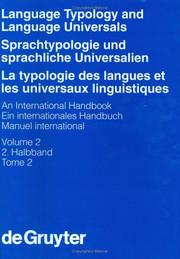
ISBN: 3110114232 3110171546 9786612193569 1282193562 3110194260 9786612193354 128219335X 3110194031 9783110194265 9783110171549 9783110194036 9783110114232 Year: 2001 Volume: 20 20 20 Publisher: Berlin de Gruyter
Abstract | Keywords | Export | Availability | Bookmark
 Loading...
Loading...Choose an application
- Reference Manager
- EndNote
- RefWorks (Direct export to RefWorks)
This series of HANDBOOKS OF LINGUISTICS AND COMMUNICATION SCIENCE is designed to illuminate a field which not only includes general linguistics and the study of linguistics as applied to specific languages, but also covers those more recent areas which have developed from the increasing body of research into the manifold forms of communicative action and interaction.For ""classic"" linguistics there appears to be a need for a review of the state of the art which will provide a reference base for the rapid advances in research undertaken from a variety of theoretical standpoints, while in the m
800.8 --- Typology (Linguistics) --- Universals (Linguistics) --- Language and languages --- Grammar, Comparative and general --- Linguistic typology --- 800.8 Taalklassen. Taalsoorten. Soorten talen. Talen: typologie --- Taalklassen. Taalsoorten. Soorten talen. Talen: typologie --- Universals --- Typology --- Linguistic universals --- Linguistics --- Classification --- Typologie (linguistique) --- Universaux (linguistique)
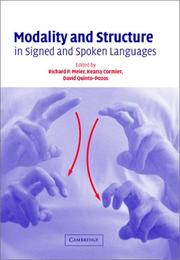
ISBN: 0521803853 0521112583 1107130883 0511178077 0511041616 0511148593 0511330421 0511486774 1280433345 0511043856 9780511041617 9780511486777 9781280433344 9786610433346 6610433348 9780521803854 9780511043857 9780521112581 Year: 2002 Publisher: Cambridge New York Cambridge University Press
Abstract | Keywords | Export | Availability | Bookmark
 Loading...
Loading...Choose an application
- Reference Manager
- EndNote
- RefWorks (Direct export to RefWorks)
The realisation that signed languages are true languages is one of the great discoveries of linguistic research. The work of many sign language researchers has revealed deep similarities between signed and spoken languages in their structure, acquisition and processing, as well as differences, arising from the differing articulatory and perceptual constraints under which signed languages are used and learned. This book provides a cross-linguistic examination of the properties of many signed languages, including detailed case studies of Hong Kong, British, Mexican and German sign languages. The contributions to this volume, by some of the most prominent researchers in the field, focus on a single question: to what extent is linguistic structure influenced by the modality of language? Their answers offer particular insights into the factors that shape the nature of language and contribute to our understanding of why languages are organised as they are.
Gesture --- Modality (Linguistics) --- Sign language --- #KVHA:Taalkunde; Gebarentaal --- #KVHA:Modaliteit --- #KVHA:Structuur --- Deaf --- Gesture language --- Mudra --- Linguistics --- Acting --- Body language --- Elocution --- Movement (Acting) --- Oratory --- Arts and Humanities --- Language & Linguistics --- Typologie (linguistique) --- Universaux (linguistique)
Book
ISBN: 9789027248411 9789027273666 9027248419 9027273669 1281145971 9781281145970 9786613776709 661377670X Year: 2012 Publisher: Amserdam Philadelphia John Benjamins Pub. Co.
Abstract | Keywords | Export | Availability | Bookmark
 Loading...
Loading...Choose an application
- Reference Manager
- EndNote
- RefWorks (Direct export to RefWorks)
The origins of sound change is one of the oldest and most challenging questions in the study of language. The goal of this volume is to examine current approaches to sound change from a variety of theoretical and methodological perspectives, including articulatory variation and modeling, speech perception mechanisms and neurobiological processes, geographical and social variation, and diachronic phonology. This diversity of perspectives contributes to a fruitful cross-fertilization across disciplines and represents an attempt to formulate converging ideas on the factors that lead to sound chan
Grammar, Comparative and general --- Linguistic universals --- Language and languages --- Linguistic change. --- Sociolinguistics. --- Phonologie --- Universaux (Linguistique) --- Variation (Linguistique) --- Changement linguistique --- Sociolinguistique --- Phonology. --- Variation. --- Grammaire --- Universaux (linguistique) --- Variation linguistique --- Linguistic universals. --- Articulatie. --- Diachronische fonologie. --- Geluid. --- Klankverschuiving. --- Grammar, Comparative and general -- Phonology. --- Language and languages -- Variation. --- Linguistic change --- Sociolinguistics --- Languages & Literatures --- Philology & Linguistics --- Phonology --- Variation --- Language and society --- Society and language --- Sociology of language --- Language and culture --- Linguistics --- Sociology --- Integrational linguistics (Oxford school) --- Universals (Linguistics) --- Typology (Linguistics) --- Change, Linguistic --- Language change --- Historical linguistics --- Characterology of speech --- Language diversity --- Language subsystems --- Language variation --- Linguistic diversity --- Variation in language --- Social aspects --- Sociological aspects --- Universals --- Phonologie. --- Philology --- Grammar, Comparative and general Phonology
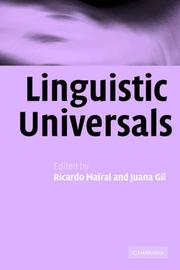
ISBN: 0521545528 9780521545525 9780521837095 052183709X 9780511618215 0511618212 0511249780 9780511249785 051124925X 9780511249259 9780511250293 0511250290 0511248709 1107161606 9781107161603 1280702222 9781280702228 9780511248702 0511248709 0511319290 9780511319297 Year: 2006 Publisher: Cambridge Cambridge University Press
Abstract | Keywords | Export | Availability | Bookmark
 Loading...
Loading...Choose an application
- Reference Manager
- EndNote
- RefWorks (Direct export to RefWorks)
The discovery of 'linguistic universals' - the properties that all languages have in common - is a fundamental goal of linguistic research. Linguists face the task of accounting for why languages, which apparently differ so greatly from one another on the surface, display striking similarities in their underlying structure. This volume brings together a team of leading experts to show how different linguistic theories have approached this challenge. Drawing on work from both formal and functional perspectives, it provides a comprehensive overview of the most notable work on linguistic universals - with chapters on syntax, semantics, phonology, morphology and typology - and explores a range of central issues, such as the relationship between linguistic universals and the language faculty, and what linguistic universals can tell us about our biological make-up and cognitive abilities. Clear and succinct, it will be invaluable to anyone seeking a greater understanding of the phenomenon that is human language.
Linguistics --- Universals (Linguistics) --- Language acquisition. --- Universaux (Linguistique) --- Langage --- Acquisition --- Language acquisition --- 801.56 --- Syntaxis. Semantiek --- 801.56 Syntaxis. Semantiek --- Linguistic universals. --- Linguistic universals --- Language and languages --- Typology (Linguistics) --- Acquisition of language --- Developmental linguistics --- Developmental psycholinguistics --- Language development in children --- Psycholinguistics, Developmental --- Interpersonal communication in children --- Psycholinguistics --- Universals --- Arts and Humanities --- Language & Linguistics
Book

ISBN: 1282716360 9786612716362 3110220938 311022092X 9783110220926 9783110220933 9781282716360 6612716363 Year: 2010 Publisher: Berlin Boston
Abstract | Keywords | Export | Availability | Bookmark
 Loading...
Loading...Choose an application
- Reference Manager
- EndNote
- RefWorks (Direct export to RefWorks)
Universals of language have been studied extensively for the last four decades, allowing fundamental insight into the principles and general properties of human language. Only incidentally have researchers looked at the other end of the scale. And even when they did, they mostly just noted peculiar facts as ''quirks'' or ''unusual behavior'', without making too much of an effort at explaining them beyond calling them ''exceptions'' to various rules or generalizations. Rarissima and rara, features and properties found only in one or very few languages, tell us as much about the capacities and limits of human language(s) as do universals. Explaining the existence of such rare phenomena on the one hand, and the fact of their rareness or uniqueness on the other, is a reasonable and interesting challenge to any theory of how human language works. The present volume for the first time compiles selected papers on the study of rare linguistic features from various fields of linguistics and from a wide range of languages.
Grammar, Comparative and general. --- Grammar, Comparative. --- Linguistic universals. --- Typology (Linguistics). --- Typology (Linguistics) --- Linguistic universals --- Grammar, Comparative and general --- Languages & Literatures --- Philology & Linguistics --- Comparative grammar --- Grammar --- Grammar, Philosophical --- Grammar, Universal --- Language and languages --- Philosophical grammar --- Universals (Linguistics) --- Linguistic typology --- Grammar, Comparative --- Universals --- Typology --- Linguistics --- Philology --- Classification --- Historical Linguistics. --- Language Typology. --- Linguistic Theories. --- Typologie (linguistique) --- Universaux (linguistique)
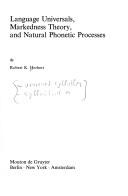
ISBN: 3110109735 3110865939 0899251234 9783110865936 9780899251233 9783110109733 Year: 1986 Volume: 25 Publisher: Berlin de Gruyter
Abstract | Keywords | Export | Availability | Bookmark
 Loading...
Loading...Choose an application
- Reference Manager
- EndNote
- RefWorks (Direct export to RefWorks)
The series publishes state-of-the-art work on core areas of linguistics across theoretical frameworks as well as studies that provide new insights by building bridges to neighbouring fields such as neuroscience and cognitive science. The series considers itself a forum for cutting-edge research based on solid empirical data on language in its various manifestations, including sign languages. It regards linguistic variation in its synchronic and diachronic dimensions as well as in its social contexts as important sources of insight for a better understanding of the design of linguistic systems and the ecology and evolution of language.
Consonants --- Nasality (Phonetics) --- Markedness (Linguistics) --- Nasal sounds (Phonetics) --- Nasalization (Phonetics) --- Sonorants (Phonetics) --- Marked member (Linguistics) --- Distinctive features (Linguistics) --- Consonants. --- Markedness (Linguistics). --- Nasality (Phonetics). --- Consonnes --- Marque (Linguistique) --- Nasalisation --- Universals (Linguistics) --- Language and languages --- Grammar, Comparative and general --- Universals --- Linguistic universals. --- Phonetics --- Linguistic universals --- Voice --- Generative grammar --- Linguistics --- Typology (Linguistics) --- Phonology --- Universaux (Linguistique) --- Universaliën. --- Nasalen [Fonetiek]. --- Consonnes. --- Universaux. --- Nasales [Phonétique]. --- Medeklinkers.
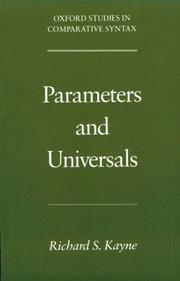
ISBN: 0195102363 0195102355 0195356217 1280528575 1429403705 9780195356212 9780195102369 9786610528578 6610528578 9780195102352 0197722121 Year: 2000 Publisher: Oxford Oxford university press
Abstract | Keywords | Export | Availability | Bookmark
 Loading...
Loading...Choose an application
- Reference Manager
- EndNote
- RefWorks (Direct export to RefWorks)
Originally published as separate volumes, this collection of essays covers issues of comparative syntax, mainly auxiliaries and inflection, as they are applied to the principal Romance languages and dialects.
Comparative linguistics --- Grammar --- Grammar, Comparative and general --- Principles and parameters (Linguistics) --- Universals (Linguistics) --- Language and languages --- Linguistics --- Typology (Linguistics) --- Generative grammar --- Syntax --- Syntax. --- Universals --- Linguistic universals. --- Syntaxe --- Principes et paramètres (Linguistique) --- Universaux (Linguistique) --- Principles and parameters (Linguistics). --- Linguistic universals --- Philology --- Grammar, Comparative and general Syntax --- Romance languages
| Listing 1 - 10 of 14 | << page >> |
Sort by
|

 Search
Search Feedback
Feedback About UniCat
About UniCat  Help
Help News
News